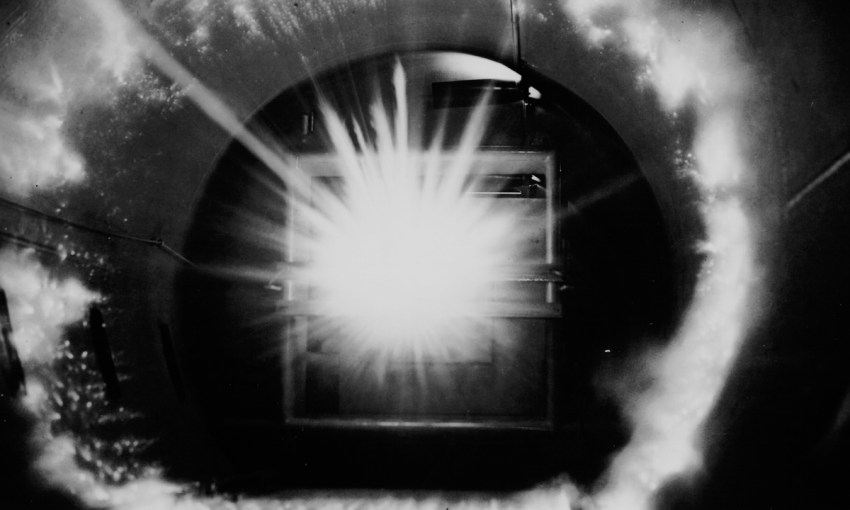Space stands on the edge of transformation – freshly accessible thanks to new technology yet under threat from emerging commercial interests. In July, as part of Hybrid World, Adelaide will be at the forefront of navigating this delicate divide.
Selling the stars
This photo shows the “energy flash” when a projectile launched at speeds up to 17,000 mph impacts a solid surface at the Hypervelocity Ballistic Range at NASA’s Ames Research Center, Mountain View, California. This test is used to simulate what happens when a piece of orbital debris hits a spacecraft in orbit. Taken on December 31, 1962.
Dr Alice Gorman describes Elon Musk sending a red Tesla convertible into orbit as “the first dick pic ever sent into space”.
She wrote an article for The Conversation saying as much. But as an expert on space junk – debris from satellites and former space missions that remains in Earth’s orbit and makes collisions likely – she has strong opinions on ego-driven additions to the atmosphere.
But, there’s another interesting aspect to Musk’s stunt, Alice says. The car, which ferried a ‘spaceman’ in its front seat, took pictures as it ascended into the galaxy, offering an entirely new perspective on space.
“Previously, we’ve had this thing where you see earth centred in the pictures taken from space,” says Alice.
“But the pictures from the Tesla – they’re not earth focussed. The car’s moving away and the earth is in the background, it’s not the focus. So, we have this radical break in gaze, which could well symbolise a shift toward the privatisation of space.”
The New Possibilities in Space panel is part of Hybrid World’s Tech Conference, which takes place July 23-24 at The Adelaide Convention Centre.
Previous photographs of space have helped humanity understand the earth as a fragile whole, significantly bolstering environmental interests. Alice argues this new way of seeing space makes it feel like a destination in itself – a new geographical area that can be reached, conquered, and commodified.
In July, as part of the Hybrid World Tech conference, Alice will be speaking on a panel alongside SA space industry entrepreneurs Dr Paddy Neumann, Flavia Tata Nardini, and Alex Grant.
While Alice is wary of the privatisation of space and its attendant complications around security and equitable access to things like communication and resources, she doesn’t necessarily see her fellow panellists as villains.
Instead, she believes the smaller Australian companies now entering the space industry could become leaders.
Advances in technology mean space is more accessible – with less wealthy companies and even schools and universities able to afford to send nanosatellites up into the atmosphere. Alice believes this could stop space becoming solely the purview of enormous companies like Tesla, with the diversity promoting a more equitable and less capitalistic regulatory environment.
Given the Federal Government has just announced a $41 million budget to establish Australia’s first ever space agency, there’s an opportunity for our industry to show the way.
“My idea is that instead of Australia being a sheep and following along, we can actually lead and take a hard line on doing what is actually best from the environment perspective,” says Alice.
“An agency can set those standards.”
Or it could not – and space, like the internet before it, could fall victim to the whims of mega-corporations motivated mostly by profit. It’s an issue that’s probably worth a panel session or two.




